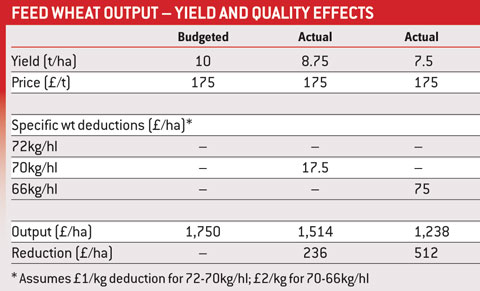Revise budgets and cashflows to account for harvest effect

The cashflow impact of this year’s harvest needs to be recognised and planned for. Robert Harris reports.
Facing a prolonged harvest and a potentially difficult drilling season, many farmers could be tempted to avoid the office for the next few weeks.
But with returns likely to be well adrift of budget, the effect on cashflow may be dramatic and should be identified and planned for to avoid shocks in the months ahead, advises consultant Paul White of Brown & Co.
“Many wheat and oilseed rape growers have experienced lower than expected yields and grain quality after one of the most difficult seasons and wettest harvests for years,” he said.
“Reduction in crop income against budget of £200-500/ha (see table below) may not be unusual, depending on price, yield loss and quality achieved. On a 300ha farm, that’s between £60,000 and £150,000 straight off the bottom line. Other crops may also suffer a significant reduction in income.

“Reductions of this magnitude could soon cause cashflow problems, especially for businesses that are already highly borrowed, and for tenant farmers who are expecting the harvest to finance high FBT rents and early input purchases.
“Those who have high cost structures will also need to do their sums carefully – any business that has only been marginally profitable after drawings over the past couple of years is likely to find this next year challenging.”
Businesses need to draw up a cashflow forecast for the 2012 harvest year or to review their existing one.
“Existing financial year budgets are unlikely to give a clear picture of the effect,” said Mr White. “A budget and cashflow forecast constructed now can include actual yields and adjusted prices taking into account crop quality.”
Expected income and outgoings and the dates when they will occur must be identified as accurately as possible to highlight the likely pinch points in the months ahead.
“But be realistic – remember input bills are unlikely to fall next year and wheat sales will be worth substantially less – talk to your merchant to find out what fallbacks on quality are likely to be.”
Those banking on the single farm payment to boost liquidity should remember it will fall by about 8% if the current exchange rate prevails on 30 September 2012, he added.
Once the budget is drawn up, it will be much easier to identify and manage the key pinch points. For many self-employed farmers one of the first will be tax bills due on 31 January and at the end of July.
Accountants needed to know where farm income or profits were likely to be reduced so action could be taken to reduce tax bills. After better profits last year, the reductions could be substantial, warned Mr White.
Hire purchase payments are often timed to follow single farm payment receipts. If so, they would be due at a similar time as tax bills. Other repayment dates should also be monitored carefully, such as those arising from deferred credit deals on fertiliser or agrochemicals.
Some businesses will also have taken cash advances on grain sales, to see the business through a pre-harvest cash squeeze.
Matching further grains sales to mitigate these pinch points would help to alleviate temporary shortfalls and those who haven’t yet done so could obtain cash advances against grain sales. Other businesses could defer purchases of machinery or other large purchases; others may opt to sell assets, without damaging the long-term prospects of the business.
Extending the overdraft is perhaps the most obvious choice. “For many, the bank will be the first port of call. Being open and honest with your lender before problems arise is the key,” said Mr White.
“Those who can show they are aware and are taking steps by, for example, drawing up a new budget, stand a much better chance of gaining the bank’s confidence and getting a supportive response.”
Budget and cashflow tips
- Revise budgets and cashflows to identify pinch points such as tax bills and HP payments
- Use realistic figures – input prices unlikely to fall next year
- On current exchange rates, SFP will be about 8% lower than in 2011
- Tax bills due in January and July – take action to reduce payments on account
- Consider cash advances on grain sales
- Banks will be looking for well-researched and realistic figures
